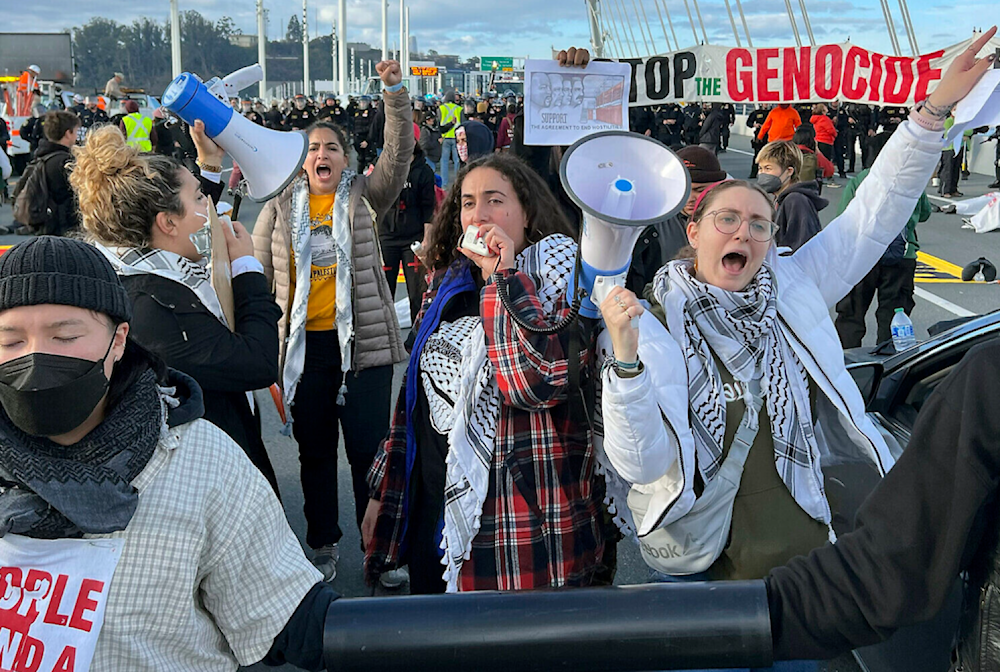Poll: Why young Americans are more pro-Palestine than their elders?
According to a recent YouGov poll, Americans aged 18-29 sympathize with Palestinians more than Israelis and are the only age group with such feelings.
-

Demonstrators calling for a ceasefire in Gaza after shutting down the San Francisco-Oakland Bay Bridge in conjunction with the APEC summit taking place on November 16, 2023. (AP)
According to a YouGov survey conducted in late October, in the current war on Gaza, Americans aged 18-29 sympathized with Palestine more than with Israelis, the only age group with such feelings. Twenty-eight percent had more compassion with Palestinians whereas 20% had more compassion for Israelis, and 31% sympathized with both equally.
Older groups, particularly those 65 and older, were more inclined to empathize with Israelis than Palestinians or both. Fourteen percent of those aged 18 to 29 believed it was "very important" for the US to safeguard "Israel", compared to two-thirds of those aged 65 and over.
In a recent poll by Harvard-Harris, a majority of young Americans said they believe that "Israel" should "be ended" and that the Palestinian land should be given back to "Hamas and the Palestinians."
According to experts, there are several reasons why Americans' attitudes toward "Israel" and its relationship with Palestinians may be influenced by their age.
Generational memories about "Israel"
Dov Waxman, director of the UCLA Younes and Soraya Nazarian Center for "Israel Studies" explained that this may be due to different "generational memories" regarding "Israel," since beliefs that are formed in the early 20's do not change easily.
Whereas older generations were convinced by their governments that the formation of "Israel" was a homeland for holocaust survivors, younger generations recall a much more violent image of "Israel."
This generation built its perception of "Israel" based on accounts of Palestinians being denied access to water, freedom of movement, and fair trials while under the military authority of a comparatively prosperous, nuclear-armed nation.
According to Joey Ayoub, a Palestinian-Lebanese writer, podcaster and academic, younger Americans can sympathize more with Palestine because they equate their struggle with that of minorities in the US.
“It’s a natural ally to the Palestinian struggle because it’s very similar if you think of it in terms of the bullet points being demanded — the right to dignity, the right to life, and so on,” he explained.
In 2014 when "Israel" killed over 2,200 Palestinians, an unarmed Black man was killed by police in Ferguson.
“Palestinian Americans were tweeting advice towards African Americans about how to deal with tear gas, for example,” he noted, adding that this made it "very symbolically powerful.”
Another reason for the divide is religious belief. Less young Americans do not identify as conservative or Christian, which are demographics far more supportive of the occupation.
The role of social media
A 2022 YouGov poll showed that Americans 45 and older are more likely to take news from TV networks and their websites, while Americans under 45 are more likely to get their news from social media.
Palestinians in Gaza, such as filmmaker Bisan Owda and photographer Motaz Azaiza, have amassed millions of followers on social media by providing footage directly from war-torn Gaza.
Algorithm isn't biased; users are overwhelmingly Pro-Palestine: TikTok
TikTok has found itself at the center of controversy as Republican politicians criticize the popular social media app for allegedly promoting pro-Palestine content following the IOF's aggression on Gaza, a report by Vice detailed in November.
Accusations have been made that TikTok is intentionally influencing American youth to support Hamas. Tensions escalated as Republicans accused the platform of attempting to "brainwash our [American] youth" with pro-Palestine content.
However, TikTok denied the allegations, asserting that the surge in such content is not a result of the app's algorithm but is reflective of the opinions of its predominantly teenage user base.
In a press release issued on Monday, TikTok stated, "Attitudes among young people skewed toward Palestine long before TikTok existed."
Citing Gallup polling data dating back to 2010, the company argued that there had been diminishing support for "Israel" among younger Americans, well before TikTok was created.

 4 Min Read
4 Min Read








